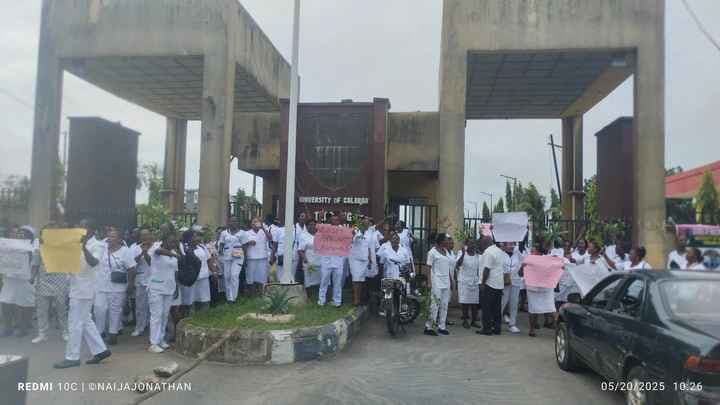On May 20, 2025, the University of Calabar Teaching Hospital (UCTH) in Cross River State, Nigeria, was thrust into chaos as nurses launched a dramatic protest, shutting down the hospital and blocking all entrances. This unprecedented action was in response to the arrest and detention of three of their colleagues by the police, reportedly for treating an unidentified patient referred to as a “stranger.” The arrests, which have been linked to allegations of stealing a deceased patient’s SIM card, have sparked outrage among the nursing staff, leading to a complete halt of hospital operations and stranding motorists attempting to access or exit the facility.
The Spark of the Protest
According to reports, the protest began after three nurses were detained by the police for nearly 24 hours. The arrests stemmed from an incident where the nurses allegedly provided medical treatment to an unidentified patient, later labeled a “stranger” by authorities. While the exact details of the patient’s identity remain unclear, additional context suggests that the nurses were also accused of stealing a SIM card belonging to a deceased patient. This accusation appears to have been the tipping point, igniting long-simmering frustrations among the hospital’s nursing staff.
The nurses’ response was swift and resolute. They barricaded all entrances to UCTH, effectively shutting down one of the region’s most critical healthcare facilities. Motorists, patients, and visitors were left stranded, unable to enter or exit the hospital premises. The blockade was not just a physical barrier but a powerful statement of solidarity and a demand for justice for their detained colleagues.

The Context of the Crisis
To fully understand the nurses’ actions, it’s essential to examine the broader context within which this incident occurred. UCTH is one of Nigeria’s leading teaching hospitals, serving as a critical healthcare provider for Cross River State and beyond. However, like many public healthcare institutions in Nigeria, it faces significant challenges, including underfunding, staffing shortages, and strained working conditions for medical professionals.
Nurses, in particular, often bear the brunt of these systemic issues. They work long hours under intense pressure, frequently with inadequate resources, low pay, and little recognition. The accusation against the three nurses—whether substantiated or not—highlights a deeper issue: the vulnerability of healthcare workers to legal and administrative overreach. Being detained for treating a patient, especially one whose identity was unclear, raises questions about the protocols and protections in place for medical professionals in Nigeria.
Moreover, the additional allegation of stealing a deceased patient’s SIM card, as mentioned, adds a layer of complexity to the situation. If true, it could point to ethical breaches, but without transparent investigations and due process, such accusations risk being perceived as scapegoating. The nurses’ decision to protest suggests they view the arrests as unjust or at the very least, mishandled.
The Protest’s Impact
The immediate impact of the nurses’ protest was the complete shutdown of UCTH. This action disrupted not only administrative functions but also critical medical services. Patients awaiting treatment, including those in emergency situations, were likely affected, though specific reports on patient outcomes remain unavailable at this time. Motorists caught in the blockade faced significant inconvenience, with some likely unable to access alternative routes due to the hospital’s central location in Calabar.
The protest also sent shockwaves through the local community and beyond, drawing attention to the plight of healthcare workers. Social media platforms, particularly X, buzzed with reactions, ranging from support for the nurses to frustration over the disruption of hospital services. The incident has sparked a broader conversation about the treatment of medical professionals, the state of Nigeria’s healthcare system, and the balance between accountability and fair treatment.
Underlying Issues in Nigeria’s Healthcare System
This protest at UCTH is not an isolated event but a symptom of deeper systemic issues within Nigeria’s healthcare sector. Public hospitals are often stretched thin, with limited funding and outdated infrastructure. Nurses and other healthcare workers frequently face burnout due to high patient loads and insufficient support. Additionally, there is a lack of clear policies to protect medical professionals from legal repercussions when treating patients in good faith, especially in cases involving unidentified individuals or emergencies.
The accusation of theft in this case also raises questions about the oversight and ethical training provided to healthcare workers. While stealing a patient’s property is a serious offense, the rush to detain the nurses without a transparent investigation suggests a lack of trust between hospital staff and law enforcement. This mistrust can erode morale and further discourage professionals from working in Nigeria’s already understaffed healthcare sector.
The Broader Implications
The shutdown of UCTH, even if temporary, has far-reaching implications. For one, it underscores the power of collective action among healthcare workers. By blocking the hospital’s entrances, the nurses demonstrated their ability to disrupt operations and demand attention to their grievances. However, this also highlights the delicate balance between advocacy and the potential harm to patients who rely on the hospital for life-saving care.
The protest also brings to light the need for reforms in how healthcare workers are treated and protected. Clear protocols for handling unidentified patients, robust legal protections for medical professionals, and transparent investigations into allegations of misconduct are essential to prevent similar crises in the future. Furthermore, the incident could prompt discussions about improving working conditions, increasing funding for public hospitals, and addressing the brain drain that sees many Nigerian nurses and doctors seek opportunities abroad.
What Happens Next?
As of now, the situation at UCTH remains fluid. The nurses’ demands likely include the release of their detained colleagues and a resolution to the allegations against them. However, without official statements from UCTH management or the police, it’s unclear how the standoff will be resolved. Negotiations between hospital authorities, the nurses’ union, and law enforcement will be critical in de-escalating the situation and restoring normalcy.
In the meantime, the protest serves as a wake-up call for stakeholders in Nigeria’s healthcare system. Policymakers, hospital administrators, and law enforcement must work together to address the root causes of such unrest. This includes ensuring fair treatment of healthcare workers, improving working conditions, and fostering an environment where medical professionals can perform their duties without fear of undue repercussions.
Conclusion
The nurses’ protest at UCTH on May 20, 2025, is a stark reminder of the challenges facing Nigeria’s healthcare system. What began as a response to the arrest of three nurses has escalated into a full-blown crisis, with the hospital’s operations grinding to a halt and the community feeling the ripple effects. This incident highlights the need for systemic reforms to support and protect healthcare workers, ensure transparent investigations, and prioritize patient care.
As the situation unfolds, all eyes will be on UCTH and how its leadership, alongside relevant authorities, navigates this crisis. For now, the nurses’ actions have amplified their voices, but the path forward requires dialogue, accountability, and a commitment to addressing the deeper issues at play.
Join our Whatsapp channel to stay updated always!


